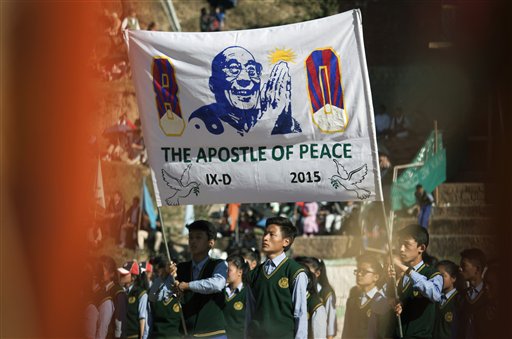US lawmaker reports ‘heated exchanges’ with China on Tibet

Exile Tibetan students carry a banner with a portrait of their spiritual leader the Dalai Lama during the Founding Anniversary celebrations of the Tibetan Children’s Village School in Dharmsala, India, Friday, Oct. 23, 2015. The school, which started as an orphanage in 1960, houses and educates over 2000 refugee children. (AP Photo/Ashwini Bhatia)
WASHINGTON — US lawmakers on a rare congressional visit to Tibet last week had “heated exchanges” with Chinese officials as they called for Beijing to renew dialogue with exiled spiritual leader, the Dalai Lama, one participant said Tuesday.
Seven Democrats led by House Minority Leader Nancy Pelosi made the first visit by U.S. lawmakers to Tibet since anti-government unrest in 2008. The region has also been largely off-limits to foreign media and diplomats since then.
Rep. Jim McGovern said the visit was an important gesture by the Chinese government but “too often” they heard characterizations of Tibet and the Dalai Lama that reflected old prejudices.
“I believe that the Dalai Lama is part of the solution, not the problem, to resolving the issues confronting Tibetan autonomy,” McGovern said, calling for genuine dialogue to address the concerns of Tibetans who are seeking more autonomy, the freedom to practice their Buddhist religion and preservation of their culture.
The Dalai Lama fled to India in 1959 amid an abortive uprising against Chinese rule and is shunned by Beijing as a separatist.
Article continues after this advertisementPelosi, who last traveled to China in 2009, said the delegation’s visit, that also took them to Hong Kong and Beijing, followed an invitation to “come see for yourself” when she raised congressional concerns over human rights with Chinese President Xi Jinping during a Washington visit in September. In Beijing, they met Chinese Premier Li Keqiang.
Article continues after this advertisement“I considered the trip constructive, bridge-building, and we want to continue building that bridge through reconciliation and clearer understanding,” Pelosi said. They also discussed cybersecurity and climate change.
McGovern said the delegation saw what Chinese officials wanted them to see in Tibet, but at Pelosi’s insistence, visited religious sites too.
They came away uncertain about what steps the Chinese government was willing to take on reconciliation in Tibet, but not feeling “the door was entirely closed to anything,” including to opening a U.S. consulate in the regional capital of Lhasa.
“Some discussions were more heated than others and there were some discussions that I felt signaled openness to a constructive dialogue,” McGovern said. TVJ
RELATED STORIES